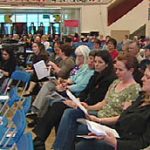EXPLORING SCHOOLS AS COMMUNITY HUBS
 Investigating application of the community hub model in context of the closure of Athabasca School, Regina, Saskatchewan, Canada and other small schools
Investigating application of the community hub model in context of the closure of Athabasca School, Regina, Saskatchewan, Canada and other small schools
Executive Summary
The purpose of this report is to research the concept and model of community hubs, specifically schools that have become community hubs, and to investigate the hub model as an alternative to the closure of Athabasca School, a neighbourhood elementary public school in Regina, Saskatchewan, that was closed at the end of the 2010-2011 school year. Information was collected through a literature review and internet search for information on community hubs in Canada, United States, United Kingdom, Africa and Australia. Interviews were also conducted with community members from the neighbourhood and Regina Public School board members to gather their thoughts and opinions regarding Athabasca School as a community hub.
Athabasca School is a small school located in Regina’s River Heights neighbourhood. This neighbourhood, part of the larger community of Lakeview, is a mixed neighbourhood with an average gross household income of $86,487 and is attracting many young families. Stated enrolment for the 2010-2011 school year is 122 students in grades pre-K to 8; and 20 students in the Functional Integrated Academic Program.
A general definition of community hub is that of a concept, community plan or urban design for a conveniently located public place that is recognized and valued in the local community as a gathering place for people, and an access point for a wide range of community activities, programs, services and events. A community hub can be general in nature, similar to a neighbourhood or multipurpose centre, or it can include specific public services such as a library, park, school, heath care and/or social support programs. Although each hub is unique to the surrounding community, three objectives are common: service coordination and delivery, place making and community building.
The school as a community hub has a great number of variations in different communities. This paper discusses ten different education models that may be considered community hubs.
The most fully developed philosophical basis for community hubs was created by David Clandfield, a retired University of Toronto professor. His ideas on the school as a community hub emphasize a two-way model how where children’s learning activities contribute to community development, and where community activities enrich learning activities.
Compared to Clandfield’s philosophical principles for flourishing community hubs, most model today should be considered works in progress. The model of schools as a community hub is an evolutionary, not revolutionary idea, and discussion of these ideals should be encouraged.
This report considers lessons learned from community schools, the context and opportunities for the Athabasca community, and questions to consider.
August 2011
Available at uregina.ca
Authored by: Dianna Graves, BA
Project Partners: Bob Hughes, Save Athabasca School Committee,Patricia Elliott, School of Journalism,Yolanda Hansen, Community Research Unit
Funded by: Community Research & Action Fund, Community Research Unit



